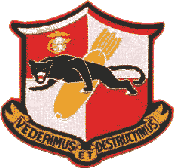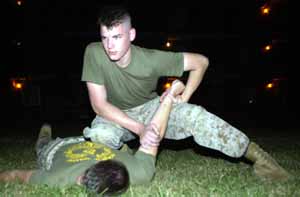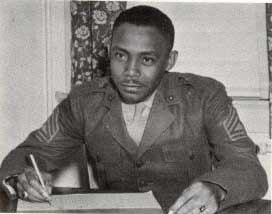U.S. Marine Corps

|
www.earsopeneyeballsclick.com |
 |
Ears,
Open. Eyeballs, Click: a movie that captures life in basic
training for the marines with incredible clarity.
Marine Corps News:
All
Marine Messages (ALMARS)
Marine
Corps and Military News
Marine
Administrative Messages
Navy/Marine
Corps News
Marine
Press Releases
Leatherneck
Marines
Magazine Online
Marine
Corps Gazette
Oo-Rah Magazine
Marine Corps History:
On November 10,
1775, the Continental Congress meeting in Philadelphia passed
a resolution stating that "two Battalions of Marines be
raised" for service as landing forces with the fleet.
This resolution, established the Continental Marines and
marked the birth date of the United States Marine Corps.
Serving on land and at sea, these first Marines distinguished
themselves in a number of important operations, including
their first amphibious raid into the Bahamas in March 1776,
under the command of Captain (later Major) Samuel Nicholas.
Nicholas, the first commissioned officer in the Continental
Marines, remained the senior Marine officer throughout the
American Revolution and is considered to be the first Marine
Commandant. The Treaty of Paris in April 1783 brought an end
to the Revolutionary War and as the last of the Navy's ships
were sold, the Continental Navy and Marines went out of
existence.
Why I Serve: Young Marine Motivated by
Discipline
By Lance Cpl. Lucian Friel
Special to American Forces Press Service
CAMP LEJEUNE, N.C., Dec. 2004 – "I just want to be
successful at anything I do and I want to always be able to
support myself," explained Pfc. Timothy A. Spreder.
"That's why I joined the Marine Corps so early in
life."
 Marine Pfc. Timothy A. Spreder applies an arm bar on a
fellow Marine during martial art training. Photo by
Lance Cpl. Lucian Friel
Marine Pfc. Timothy A. Spreder applies an arm bar on a
fellow Marine during martial art training. Photo by
Lance Cpl. Lucian Friel
(Click photo for screen-resolution image); high-resolution
image available. |
The Boone County,
Ky., native became a Marine at age 17 with his parents'
permission.
As a young man
attending Simon Kenton High School, Spreder
wasn't involved in many activities. As a 16-year-old without any
direction in his life, he joined the Army National Guard's
Bluegrass Challenge at Fort Knox, Ky. The challenge, which is a
six-month boot camp-like program, helped Spreder receive his
General Educational Development diploma.
"I knew the
military was my only option, because high school wasn't working
out for me, and I wanted the discipline the challenge
offered," Spreder explained. "It put me on the path to
success, because you can't go anywhere without a high school
diploma."
Upon completing the
challenge program, Spreder's parents signed his four-year
contract with the Marines. He said his parents, Monica and Dale
Spreder, provided him with the support he needed to accomplish
the goals he wanted to reach.
"My mom and dad
always supported me," Spreder said. "They knew I
understood what I was getting into," he noted. "They
taught me how to show respect for others, which was fine-tuned
by the Marine Corps."
The receptions clerk
is responsible for checking all new Marines into the 2d Marine
Division. "I come in contact with all different types of
Marines, so this job has enhanced my skills in dealing with
people," Spreder said.
He said his
aspirations are similar to most people's. "I just want to
be successful at anything I do, and I want to always be able to
support myself," he explained. "That's why I joined
the Marine Corps so early in life."
As a Marine, Spreder
has come to realize that a schedule can be more beneficial than
he ever imagined. "Before I joined, it would take about two
months for me to actually get things done," he said.
"But now, life seems so much easier, because I get
everything done ahead of time so I'm not rushed to complete it.
"I wanted to
serve in the military. I knew it was what I was meant to do, and
as a Marine I strive to be the best."
(Marine Lance Cpl.
Lucian Friel is a combat correspondent with the 2nd Marine
Division.)
Marine Corps' Core Values Remain Unchanged for 229 Years
By Kathleen T. Rhem
American Forces Press Service
WASHINGTON, Nov. 2004 -- Two hundred
twenty-nine years ago, Marines came ashore from sailing ships;
today they come off large amphibious ships. But the service's
core values have remained the same, the top Marine general said.
"The young
Marines today … are emulating the warrior ethic that the
Marines who went before established," Marine Commandant
Gen. Michael W. Hagee said Nov. 5 in an interview with the
Pentagon Channel and American Forces Press Service.
Hagee, the Corps'
33rd commandant, explained that "Marines that have gone
before us really set the standard" in famous battles such
as Belleau Wood, in France in World War I; Iwo Jima, in Japan in
World War II; and the Chosin Reservoir, in the Korean War.
As the Corps
celebrates its 229th birthday today, modern Marines have much in
common with those long-ago warriors, Hagee said. "We are a
force in readiness, and we've always been a force in
readiness," he said. "We're an expeditionary force,
and by expeditionary I mean expeditionary in the fullest sense.
In other words, when we arrive, we can sustain ourselves. And
finally, we are a combined-arms team. That has remained the same
for years and years."
Still, today's
junior Marines shoulder much more responsibility than their
predecessors. Hagee said the war on terrorism is
"essentially a war at the squad-leader and platoon-leader
level."
In 1999,
then-Commandant Gen. Charles Krulak wrote of "the strategic
corporal" – young Marines "far from the flagpole
without the direct supervision of senior leadership."
Modern Marines
"will be asked to deal with a bewildering array of
challenges and threats," Krulak wrote in Marines magazine.
"In order to succeed under such demanding conditions they
will require unwavering maturity, judgment, and strength of
character."
Hagee said the
emergence of "the strategic corporal" makes it much
more vital that Marines continue their education -- and that the
Corps make education opportunities available to Marines.
"We've got
corporals and sergeants out there making very important
decisions. And they don't have time to get a 3x5 card out of
their pocket, and they don't have time to check with
anyone," he said. "They need to make the decision
there. And in order to prepare them to do that, we have to
properly educate them."
The commandant said
he'd like to see that every Marine has the opportunity to earn
at least a bachelor's degree over the course of a career.
In a wide-ranging
interview about the past, present and future of the Marine
Corps, Hagee said he's often inspired when visiting Marines who
have been wounded in Iraq. He said it's "uplifting" to
spend time with these young Marines.
"They're very
proud of what they have done. They're not thinking about
themselves," Hagee said of the wounded Marines he's
visited. "They want to know how their unit is doing, and
they consistently tell me, 'I am ready to go back.'"
The general also
offered words on encouragement for those Marines who are manning
home stations and are not deployed to a war zone. "What I
tell the Marines who are back here in the United States is,
'Just think what you have done over the past year,'" Hagee
said.
He noted that
Marines who are not deployed are a vital part of training and
equipping those who are deployed. "Without the support of
Marines back here in the United States, the force protection and
the capabilities of the Marines in theater would be much
less," he said. "Everyone has an important job,
whether you're forward or whether you're back here."
Speaking before
Operation Al Fajr began in Fallujah, Iraq, on Nov. 8, Hagee said
the Marines preparing to carry out that operation were ready for
what they would face and were in good spirits. "I would
argue that the reason they feel so confident is that they're
properly equipped, properly trained, properly led, and they
understand the importance of the mission," he said.
Looking to the
future of the force, Hagee said the Corps would maintain its
character and its three core missions: to maintain the service's
force-in- readiness posture, to maintain a combined-arms team
and to maintain the Marines' expeditionary character.
In short, he said,
the Marines will remain "most ready (to respond) when the
nation is least ready."
Biography:
Gen.
Michael W. Hagee, USMC
A Tribute to the Fist Black
Marines in WWII

T/SGT JAMES E STEWART SR.
My father was one of the first black Marines. I was born at Montford Point.
This is a story that needs to get out. There
were black Marines fighting in WWII
on all the famous islands.